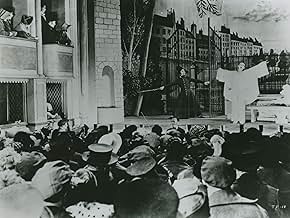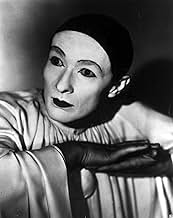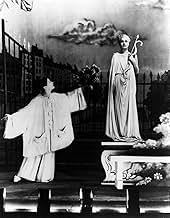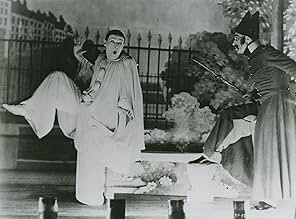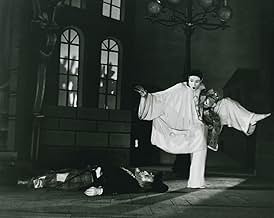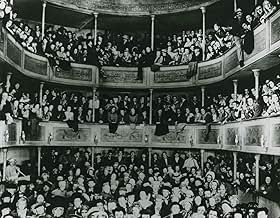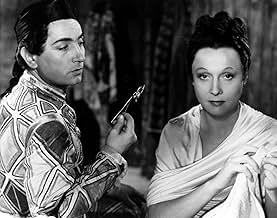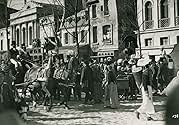IMDb-BEWERTUNG
8,3/10
22.039
IHRE BEWERTUNG
Das theatralische Leben einer schönen Kurtisane und der vier Männer, die sie lieben.Das theatralische Leben einer schönen Kurtisane und der vier Männer, die sie lieben.Das theatralische Leben einer schönen Kurtisane und der vier Männer, die sie lieben.
- Für 1 Oscar nominiert
- 2 Gewinne & 1 Nominierung insgesamt
María Casares
- Nathalie
- (as Maria Casarès)
Palau
- Le régisseur des Funambules
- (as Pierre Palau)
Etienne Decroux
- Anselme Debureau
- (as Étienne Decroux)
Jane Marken
- Mme Hermine
- (as Jeanne Marken)
Raymond Rognoni
- Le directeur du Grand Théâtre
- (as Rognoni)
Empfohlene Bewertungen
"Les Enfants du Paradis" is my favorite movie of all time, and if you don't agree with me, you must admit it's surely one of the most beautiful. The film is about one woman, Garance (Arletty), who is loved by many men in early Paris. It is definitely Marcel Carne's crowning achievement, and to think this movie was even made is a miracle. Sadly, this movie is unseen by many, and isn't even on IMDb's Top 250 list. It's really too bad that such a stunning film would be so underrated. Please take my word, overlook the running time, and check out "Children of Paradise." (****/****)
CHILDREN OF PARADISE has a history almost as remarkable as the film itself. Production was just beginning when Paris fell to the Nazis; the work was subsequently filmed piecemeal over a period of several years, much of it during the height of World War II. And yet astonishingly, this elaborate portrait of 19th Century French theatre and the people who swirl through it shows little evidence of the obvious challenges faced by director Marcel Carne, his cast, and his production staff. CHILDREN OF PARADISE seems to have been created inside a blessed bubble of imagination, protected from outside forces by the sheer power of its own being.
The story is at once simple and extremely complex. A mime named Baptiste (Jean-Louis Barrault) falls in love with a street woman known as Garance (Arletty)--and through a series of coincidences and his own love for her finds the inspiration to become one of the most beloved stage artists of his era. But when shyness causes him to avoid consummation of the romance, Baptiste loses Garance to her own circle of admirers--a circle that includes a vicious member of the Paris underworld (Marcel Herrand), rising young actor (Pierre Brasseur), and an egotistical and jealous aristocrat (Louis Salou.) With the passage of time, Garance recognizes that she loves Baptiste as deeply as he does her... but now they must choose between each other and the separate lives they have created for themselves.
While the film is sometimes described as dreamy in tone, it would be more appropriately described as dreamy in tone but extremely earthy in content. Instead of giving us a glamorous portrait of life in theatre, it presents 19th Century theatre as it actually was: dominated by noisy audiences perfectly capable of riot, the actors usually poor and hungry and mixing freely with criminal elements, the desperate struggle to rise above the chaos to create something magical on stage. And while the film is not sexually explicit by any stretch of the imagination, by 1940s standards CHILDREN OF PARADISE was amazingly frank in its portrayal of Garance's often casual liaisons; American cinema would not achieve anything similar for another twenty years.
Everything about the film seems to swirl in a riot of people, costumes, and overlapping relationships, a sort of mad confusion of life lived in a very elemental manner. And the cast carries the director's vision to perfection. Jean-Louis Barrault is both a brilliant actor and brilliant mime, perfectly capturing the strange innocence his role requires; the famous Arletty offers a divine mixture of exhaustion, sensuality, and self-awareness that makes Garance and her fatal attraction uniquely believable. And these performances do not stand in isolation: there is not a false note in the entire cast, the roles of which cover virtually every level of society imaginable.
With its complex story, vivid performances, and stunning set pieces, the film has a longer running time than one might expect, and some may feel it is slow; I myself, however, did not read it as slow so much as precise. It takes the time to allow the characters and their various stories to develop fully in the viewer's mind. I must also note that while a knowledge of theatre history isn't required to fall under the spell of this truly fascinating film, those who do have that background will find it particularly appealing. CHILDREN OF PARADISE is one of the few films that can be viewed repeatedly, one of the truly great masterpieces of cinema. Strongly, strongly recommended.
Gary F. Taylor, aka GFT, Amazon Reviewer
The story is at once simple and extremely complex. A mime named Baptiste (Jean-Louis Barrault) falls in love with a street woman known as Garance (Arletty)--and through a series of coincidences and his own love for her finds the inspiration to become one of the most beloved stage artists of his era. But when shyness causes him to avoid consummation of the romance, Baptiste loses Garance to her own circle of admirers--a circle that includes a vicious member of the Paris underworld (Marcel Herrand), rising young actor (Pierre Brasseur), and an egotistical and jealous aristocrat (Louis Salou.) With the passage of time, Garance recognizes that she loves Baptiste as deeply as he does her... but now they must choose between each other and the separate lives they have created for themselves.
While the film is sometimes described as dreamy in tone, it would be more appropriately described as dreamy in tone but extremely earthy in content. Instead of giving us a glamorous portrait of life in theatre, it presents 19th Century theatre as it actually was: dominated by noisy audiences perfectly capable of riot, the actors usually poor and hungry and mixing freely with criminal elements, the desperate struggle to rise above the chaos to create something magical on stage. And while the film is not sexually explicit by any stretch of the imagination, by 1940s standards CHILDREN OF PARADISE was amazingly frank in its portrayal of Garance's often casual liaisons; American cinema would not achieve anything similar for another twenty years.
Everything about the film seems to swirl in a riot of people, costumes, and overlapping relationships, a sort of mad confusion of life lived in a very elemental manner. And the cast carries the director's vision to perfection. Jean-Louis Barrault is both a brilliant actor and brilliant mime, perfectly capturing the strange innocence his role requires; the famous Arletty offers a divine mixture of exhaustion, sensuality, and self-awareness that makes Garance and her fatal attraction uniquely believable. And these performances do not stand in isolation: there is not a false note in the entire cast, the roles of which cover virtually every level of society imaginable.
With its complex story, vivid performances, and stunning set pieces, the film has a longer running time than one might expect, and some may feel it is slow; I myself, however, did not read it as slow so much as precise. It takes the time to allow the characters and their various stories to develop fully in the viewer's mind. I must also note that while a knowledge of theatre history isn't required to fall under the spell of this truly fascinating film, those who do have that background will find it particularly appealing. CHILDREN OF PARADISE is one of the few films that can be viewed repeatedly, one of the truly great masterpieces of cinema. Strongly, strongly recommended.
Gary F. Taylor, aka GFT, Amazon Reviewer
It's one of the best films ever made and one of my favourite films, although the first time I attempted to see it at 14 years old in 1973 I didn't understand it at all. I tried again four years older and it won me over. Personal tastes vary not only between people but within people over time. Nowadays I can't understand why some people can't understand it and get nothing from this timeless world classic - at the very least they could look upon it as the closest the French cinema ever got to Dickens.
Meandering tale set in 1840's France has whimsically smiling Garance played by Arletty in love with mime artist Baptiste played perfectly by Jean-Louis Barrault but with three other men in love with her too. These are the Dramatic Actor Lemaitre played by Pierre Brasseur (Lucien from Le Quai Des Brumes), the cynically corrupt Lacenaire by Marcel Herrond (Renaud from Les Visiteurs Du Soir) and stiffly possessive Montray by Louis Salou. With Maria Casares as the faithful Nathalie the trouper in love with Baptiste and you have the main cast for your delectation. Just as the characters in the plays at the Funambules depended upon the pleasure of the audience up in "the Gods" so do the actors on the screen – although now thanks to TV and DVD us people up in the Gods are a lot more distant! The main thread is how and why all the tangled love affairs unravel. The film is littered with eccentric characters and heavy poetic observations, backed up with a logical plot, incredible sets and unforgettable acting – all made under the Nazi occupation. Adversity often heightens the senses, but Carne and Prevert excelled themselves with this production. Favourite bits: Baptiste proving Garrance's innocence of stealing a watch in mime to the assembled crowd; the touchy scenes inside the aptly-named Robin Redbreast pub; Garance and Lemaitre in the deeply shaded box at the Funambules watching Baptiste perform; his calling her beautiful and her response of "No, just alive, that's all"; Lemaitre revising the play in which he was acting on the stage; his opinion of mulled wine – "Like God slipping down your throat in red velvet breeches"; Lacenaire's lacerated opinion of everything – especially of Montray; the bookend bustling street scenes at the start and finish; the astounding ending; and on and on – so much richness to see and hear in three hours!
It's a world portrayed in great detail and lovingly, done in the best French tradition: dreamy, full of poetry, a frisson of sex and a little violence. As with me, it may need a little patience to cultivate this particular flower, but if you allow it into your heart it will never leave you again. Definitely High Art!
Meandering tale set in 1840's France has whimsically smiling Garance played by Arletty in love with mime artist Baptiste played perfectly by Jean-Louis Barrault but with three other men in love with her too. These are the Dramatic Actor Lemaitre played by Pierre Brasseur (Lucien from Le Quai Des Brumes), the cynically corrupt Lacenaire by Marcel Herrond (Renaud from Les Visiteurs Du Soir) and stiffly possessive Montray by Louis Salou. With Maria Casares as the faithful Nathalie the trouper in love with Baptiste and you have the main cast for your delectation. Just as the characters in the plays at the Funambules depended upon the pleasure of the audience up in "the Gods" so do the actors on the screen – although now thanks to TV and DVD us people up in the Gods are a lot more distant! The main thread is how and why all the tangled love affairs unravel. The film is littered with eccentric characters and heavy poetic observations, backed up with a logical plot, incredible sets and unforgettable acting – all made under the Nazi occupation. Adversity often heightens the senses, but Carne and Prevert excelled themselves with this production. Favourite bits: Baptiste proving Garrance's innocence of stealing a watch in mime to the assembled crowd; the touchy scenes inside the aptly-named Robin Redbreast pub; Garance and Lemaitre in the deeply shaded box at the Funambules watching Baptiste perform; his calling her beautiful and her response of "No, just alive, that's all"; Lemaitre revising the play in which he was acting on the stage; his opinion of mulled wine – "Like God slipping down your throat in red velvet breeches"; Lacenaire's lacerated opinion of everything – especially of Montray; the bookend bustling street scenes at the start and finish; the astounding ending; and on and on – so much richness to see and hear in three hours!
It's a world portrayed in great detail and lovingly, done in the best French tradition: dreamy, full of poetry, a frisson of sex and a little violence. As with me, it may need a little patience to cultivate this particular flower, but if you allow it into your heart it will never leave you again. Definitely High Art!
1995 was the centennial of the invention of movies. In Stockholm the event was celebrated, inter alia, by showing 'Les enfants du paradis' free of charge on the French National Day. It was presented as the best French movie ever made. Perhaps it was felt not to be polite toward other countries to talk of the best movie made in any countries. But many (not all) experts agree that it is indeed so. And so do I. I saw the film for the first time in 1954, and have never changed my mind about its paramount position. But whatever you may think in this respect, one of the most prominent features is that the movie is a 'GESAMTKUNSTWERK'. This word was invented by Richard Wagner to indicate a work in which music, text, and visual arts fuse or amalgamate into a unity. Concerning the movie at hand, the word is of course taken in a different sense. The movie contains all kinds of cinematic categories: mass scenes perhaps with 10'000 extras, chamber play with close-up photos of emotional faces, deep and genuine love, superficial sex, friendship, comic pantomime, tragic pantomime, comic theatre (that is, both the theatre scene and the public on the screen), tragic theatre, murder, hand-to-hand-fighting, pocket-picking, etc. And everything put together into one single film. Even more, whenever a section is comic, it rests so completely in the comic mood that the spectator cannot imagine that the entire movie was not comic from the first beginning, and will not remain so to the last end. Whenever it is tragic, it rests equally completely in the tragic mood, as if it had never been anything else than tragic and would never leave the tragic mood. Despite this heterogeneity, the movie does not split up in disparate fragments, but forms a genuine whole. The writer was the really great poet Jacques Prévert, and it tells much about his unusual competence that, on the one hand, each scene is superb when seen in isolation and, on the other hand, each scene does not therefore fit less perfectly in the film as a whole. - - - To some people it may be interesting to know that four of the roles are real historical persons: the actor Frederick Lemaître, the pantomimic performer Baptiste Debureau, the mediocre gangster Jean-François Lacenaire, and the latter's assistant Avril. Lacenaire was executed in 1836. His memoirs, which were written while he awaited execution, are published in English translation.
it takes a real poet to write dialog this incisive, not that i speak french, but the new subtitles are very clear (visually) and concise (linguistically)... the poet was jacques prevert, the director marcel carne, and if you want to know how powerful real moviemaking can be, you have to see this picture... as in all true tragedy, the various pairs of lovers comment by their actions on each other's destinies... baptiste/garance are the main pair we care most about, but all the others contribute to and contrast with their true, genuine, doomed affair... the shadows of the main pair are baptiste/nathalie, and garance/frederick, descending to the sick depths of garance/edouard, lacenaire/avril, and jericho/himself. it's like a deck of cards with all possible combinations revealed. based on a true story, set against the theatre milieu of the 1840s, this has the world's best crowd scenes, partially because carne employed every actor in france who needed saving from the nazis, including hiding jews on the set (it was made during WWII). the use of mime advances the plot and is not simply an excuse for baptiste to show off his real-life talents (jean-louis barrault conducts a school of mime in france to this day.) the stunningly vibrant arletty plays garance, a whore with a heart, as if such a thing had never happened before... and until she did it her way, it hadn't...
Wusstest du schon
- WissenswertesFilming was completed a short time before D-Day and the director, having planned to distribute the film after the liberation of France, had three copies printed and concealed in three different places: a cellar of the Banque de France, a strongbox of Pathé and a Provence country house.
- PatzerIn the outdoor market scene, the amount of food laid out on the tables varies from shot to shot. The reason is that the extras were famished from years of wartime food rationing, and stole food whenever they were not closely watched.
- Zitate
Frederick: Words and phrases leave you cold. You tell your story without speaking. And you do it so well. You really astonished me. Your legs speak, your hands answer. A glance, a shrug, a step forward, back and they understand up in the Gods.
Baptiste: They understand, though they are poor. I'm like them. I love them, I know them. Their lives are small, but their dreams are vast.
- Alternative VersionenThere are various alternate cuts of this film; the complete version runs 195 minutes and has been restored on video.
- VerbindungenEdited into Es war einmal ..: Les enfants du paradis (2009)
Top-Auswahl
Melde dich zum Bewerten an und greife auf die Watchlist für personalisierte Empfehlungen zu.
- How long is Children of Paradise?Powered by Alexa
Details
Box Office
- Budget
- 58.000.000 FRF (geschätzt)
- Bruttoertrag in den USA und Kanada
- 36.986 $
- Eröffnungswochenende in den USA und in Kanada
- 10.741 $
- 11. März 2012
- Weltweiter Bruttoertrag
- 44.906 $
- Laufzeit
- 3 Std. 9 Min.(189 min)
- Farbe
- Sound-Mix
- Seitenverhältnis
- 1.37 : 1
Zu dieser Seite beitragen
Bearbeitung vorschlagen oder fehlenden Inhalt hinzufügen



